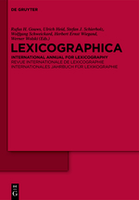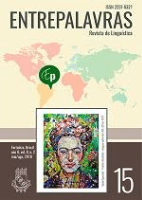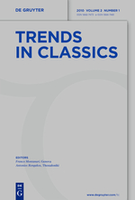
LEXICOGRAPHICA
Scope & Guideline
Advancing Linguistic Knowledge, One Word at a Time
Introduction
Aims and Scopes
- Interdisciplinary Lexicography:
The journal promotes the integration of various disciplines within lexicography, including linguistics, cultural studies, and history, providing comprehensive insights into the complexities of dictionary-making and language documentation. - Cultural Representation:
A significant focus is placed on how dictionaries reflect cultural identities and ideologies, with studies examining the representation of culture-bound items and the impact of historical contexts on lexicographical practices. - Terminology and Specialized Language:
The exploration of specialized terminologies across different languages and fields is a core area, highlighting innovative methodologies for extracting and structuring lexicons relevant to various domains. - Critical Analysis of Lexicographic Practices:
The journal encourages critical examinations of lexicographic works, especially regarding issues of linguistic exclusion, ideological biases, and the societal implications of dictionary definitions. - Technological Innovations in Lexicography:
There is a growing emphasis on the impact of technology on lexicography, including AI-based models and digital resources that enhance the accessibility and functionality of dictionaries.
Trending and Emerging
- Cultural and Social Inclusivity:
There is a growing focus on how lexicography can promote inclusivity and representation, particularly regarding marginalized groups and the examination of linguistic exclusion in historical and contemporary dictionaries. - AI and Digital Lexicography:
The integration of artificial intelligence and digital technologies in lexicography is becoming a significant theme, exploring how these innovations can transform dictionary-making and enhance user engagement. - Multilingual and Comparative Studies:
Emerging interest in multilingual lexicography reflects the need to understand language in a globalized context, emphasizing the importance of comparative studies across different languages and cultures. - Lexicography and Identity:
Research exploring the relationship between lexicography and cultural identity is on the rise, with studies examining how dictionaries shape and reflect societal values and cultural narratives. - Critical Discourse Analysis in Lexicography:
There is an increasing trend towards using critical discourse analysis to examine the ideological implications of dictionary entries, addressing how language choices can perpetuate or challenge societal norms.
Declining or Waning
- Historical Lexicography:
Research focusing on historical lexicography, while still present, appears to be declining in frequency, as contemporary issues and technologies take precedence in the discussions around dictionary creation and use. - Traditional Lexicographic Methods:
The emphasis on conventional lexicographic methodologies is waning, as newer approaches and digital tools gain traction, reflecting a broader trend towards innovation in the field. - Single-Language Dictionaries:
The focus on single-language dictionaries is becoming less prominent, with an increasing interest in multilingual and comparative lexicography that addresses global language dynamics. - Static Definitions:
Research centered on static definitions in dictionaries is declining, as there is a shift towards dynamic and context-sensitive approaches that reflect the evolving nature of language. - Prescriptive vs. Descriptive Approaches:
The debate between prescriptive and descriptive lexicography is becoming less central, as researchers increasingly recognize the value of integrating both perspectives in understanding language use.
Similar Journals

Mandenkan-Bulletin Semestriel d Etudes Linguistiques Mande
Pioneering Research in Mande LinguisticsMandenkan-Bulletin Semestriel d'Etudes Linguistiques Mande is an esteemed academic journal dedicated to the exploration of Mande languages and linguistics, published by the Centre National de Recherche Scientifique in France. With its ISSN 0752-5443, this journal has established itself within the linguistic community, holding a notable Q3 ranking in both the Linguistics and Language category as well as respectable standings in Scopus ranks, placing it in the 55th percentile for language and linguistics. Since its inception in 2018, it has been pivotal in publishing groundbreaking research that advances our understanding of the Mande language family and its cultural implications. Although currently not open access, the journal offers a wealth of knowledge fostered through rigorous peer-reviewed articles aimed at linguists, researchers, and students alike, making significant contributions to the fields of linguistics and African studies.

LINGUA NOSTRA
Illuminating the complexities of language studies.LINGUA NOSTRA, an esteemed journal published by CASA EDITRICE G C SANSONI SPA, has been a notable contributor to the field of linguistics since its inception in 1968. With an ISSN of 0024-3868, this journal is dedicated to advancing knowledge and research in linguistics and language studies. Despite its current Q4 category ranking in both the Linguistics and Language fields, and its Scopus ranking placing it in the lower percentiles, LINGUA NOSTRA remains a valuable resource for emerging and established scholars alike, offering insights into various linguistic phenomena. The journal publishes original research, reviews, and theoretical works that stimulate discourse in linguistic practices and methodologies. Based in Florence, Italy, this journal is not open access but continues to be a crucial platform for linguistic inquiry and findings, bridging historical and contemporary linguistic theories as it converges over the decades.

Entrepalavras
Fostering Connections through Language ResearchEntrepalavras, an esteemed journal published by Federal University of Ceará, serves as a vital platform for scholarly discourse in the field of linguistics, language studies, and communication. Since its inception, the journal has embraced an Open Access model, promoting widespread dissemination of research findings and fostering collaboration among researchers, professionals, and students alike. With its ISSN 2237-6321 and consistent focus on contemporary linguistic issues and educational practices, Entrepalavras contributes meaningfully to the academic community, particularly in Brazil and beyond. By providing open access to valuable research, the journal aims to bridge gaps in knowledge, stimulate innovative approaches, and enhance the understanding of language dynamics in various contexts. Researchers and practitioners are encouraged to explore the wealth of insights presented in each issue and contribute to this growing body of work.

Language Documentation & Conservation
Preserving Voices, Empowering Futures.Language Documentation & Conservation, published by University of Hawaii Press, is an esteemed open-access journal dedicated to the preservation and study of endangered languages and linguistic diversity. With a commitment to accessibility since its inception in 2012, the journal serves as a vital resource for researchers, professionals, and students in the fields of linguistics, library and information sciences, and computer science applications. It holds notable Scopus rankings, particularly in linguistics and language, where it ranks 272 out of 1167, reflecting its impactful contributions to the field. Covering a wide spectrum of interdisciplinary studies related to language documentation, the journal not only aims to advance scholarly dialogue but also strives to engage with global challenges around linguistic conservation. As it continues to evolve and publish insightful research from 2016 through 2024, Language Documentation & Conservation remains an important platform for advocating for the sustainability of linguistic heritage across communities.

Hrvatski Dijalektoloski Zbornik
Advancing Linguistic Knowledge through DialectologyHrvatski Dijalektoloski Zbornik is an esteemed academic journal dedicated to the field of Dialectology and Linguistic Research, published by the Croatian Academy of Sciences and Arts, Department of Linguistic Research. With an Open Access policy established since 2015, the journal aims to promote the dissemination of research findings and encourage scholarly exchange among linguists and dialectologists. The journal has achieved recognition in the field, ranking in the Q3 category for Linguistics and Language in 2023, and its impact can be further gauged through its Scopus rankings, positioning it favorably within both the Arts and Humanities and Social Sciences categories. As it converged its publication years from 2017 to 2023, the journal continues to showcase rigorous research from various dialectical studies, contributing significantly to the understanding of language variation and evolution in Croatia and beyond. Researchers, professionals, and students alike are encouraged to explore the rich compendium of linguistic scholarship that this journal offers.

REVUE DE LINGUISTIQUE ROMANE
Charting the Evolution of Romance LinguisticsREVUE DE LINGUISTIQUE ROMANE, published by the esteemed SOCIÉTÉ LINGUISTIQUE ROMANE, is a prominent academic journal dedicated to the exploration of Romance linguistics. With its ISSN 0035-1458, the journal plays a significant role in advancing knowledge within the fields of linguistics and the history and philosophy of science. Although it does not currently offer Open Access, it provides critical insights and peer-reviewed research that are indispensable for scholars, educators, and students interested in the nuances of Romance languages. The journal, which has seen converged coverage from 2006 to 2017, and then again from 2019 to 2021, is ranked in the third quartile (Q3) across various categories within Scopus, reflecting its established presence in the academic community. As a vital resource for interdisciplinary studies, REVUE DE LINGUISTIQUE ROMANE is instrumental for those seeking to deepen their understanding of linguistic structures, cultural nuances, and the historical development of Romance languages.

Trends in Classics
Fostering critical dialogue in the field of Classics.Trends in Classics is a distinguished academic journal published by WALTER DE GRUYTER GMBH, dedicated to advancing the field of Classics through critical scholarship and innovative research. With an ISSN of 1866-7473 and an E-ISSN of 1866-7481, this journal offers a platform for scholars from around the globe to share insights on classical literature, history, and archaeology. Indexed in Scopus and awarded a respectable Q4 classification in Classics, it ranks 48th out of 170 in the Arts and Humanities category, placing it in the top 72nd percentile—an indicator of its growing influence and contribution to the field. Operating from Germany, specifically from Genthin Strasse 13, D-10785 Berlin, the journal spans converged years from 2009 to 2024, fostering ongoing dialogues and developments within classical studies. Although it does not currently offer open access, its commitment to scholarly excellence makes it a vital resource for researchers, professionals, and students alike, who seek to deepen their understanding of ancient cultures and their lasting impacts on contemporary society.

Quaderns de Filologia-Estudis Linguistics
Innovative Research for the Linguistic Frontier.Quaderns de Filologia-Estudis Linguistics is a distinguished open-access journal published by the Universitat de València, Facultat de Filologia, specializing in the study of linguistics and language. With its ISSN 1135-416X and E-ISSN 2444-1449, this journal has been a valuable resource for scholars in the field since its transition to open access in 2012. Located in Valencia, Spain, it contributes significantly to the discourse within the Linguistics and Language category, currently holding a Q3 quartile ranking as per Scopus. The journal is dedicated to the dissemination of innovative research findings and theoretical discussions, ensuring that both emerging and established scholars have a platform for their work. Its inclusive scope and commitment to quality research help navigate the complex landscape of linguistic studies, making it an essential resource for researchers, professionals, and students alike. With converged years covering from 2019 to 2023, Quaderns de Filologia continues to foster a vibrant academic community, encouraging submissions that advance the field of linguistics.

Lexikos
Fostering interdisciplinary insights in language and linguistics.Lexikos is a distinguished academic journal in the field of linguistics and language studies, published by BURO VAN DIE WAT in South Africa. Since its establishment in 1991, Lexikos has maintained an open-access format, allowing researchers, professionals, and students unrestricted access to its valuable content. The journal operates under a comprehensive scope, emphasizing the intersection of language, linguistics, and cognitive studies, making it a vital resource for scholars in these fields. With an impressive Q2 ranking in the Linguistics and Language category for 2023, Lexikos is recognized for its rigorous peer-review process and high-quality publications, contributing significantly to both the Arts and Humanities and Social Sciences disciplines. Its Scopus ranking positions it favorably within the industry, showcasing its impact and relevance with 68th and 65th percentiles in respective categories. By fostering a platform for innovative research and interdisciplinary dialogue, Lexikos plays a crucial role in advancing knowledge and understanding in linguistics and language studies.

Studia z Filologii Polskiej i Slowianskiej
Illuminating the Nuances of Slavic LanguagesStudia z Filologii Polskiej i Slowianskiej is a prominent journal published by the Polish Academy of Sciences, Institute of Slavic Studies, focusing on the rich and diverse field of linguistics and language studies, particularly within the Slavic context. With the ISSN 0081-7090 and E-ISSN 2392-2435, this open-access journal has been a valuable resource for researchers, professionals, and students since its transition to an open-access model in 2014. It features rigorous peer-reviewed articles that contribute to the understanding of linguistic phenomena and cultural narratives across Slavic languages. Recognized within the Q3 quartile of linguistics and language in 2023, it ranks at the intersection of arts, humanities, and social sciences, providing insights that echo through disciplines such as sociolinguistics, psycholinguistics, and philology. In its ongoing publication trajectory from 2011 to 2023, Studia z Filologii Polskiej i Slowianskiej continues to foster academic discourse and collaboration, positioning itself as a key player in the global linguistic community.